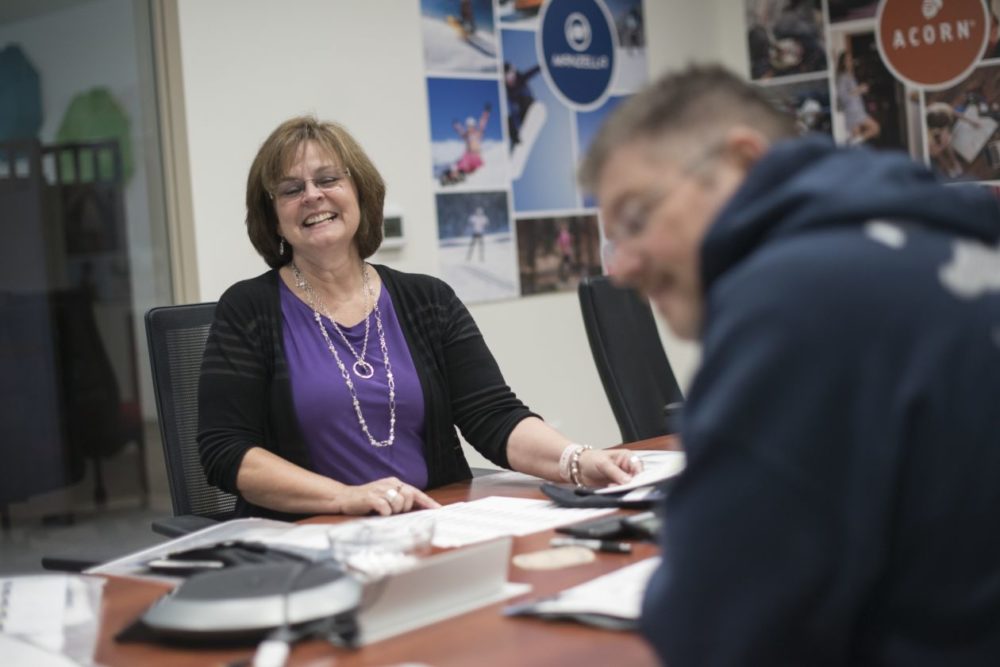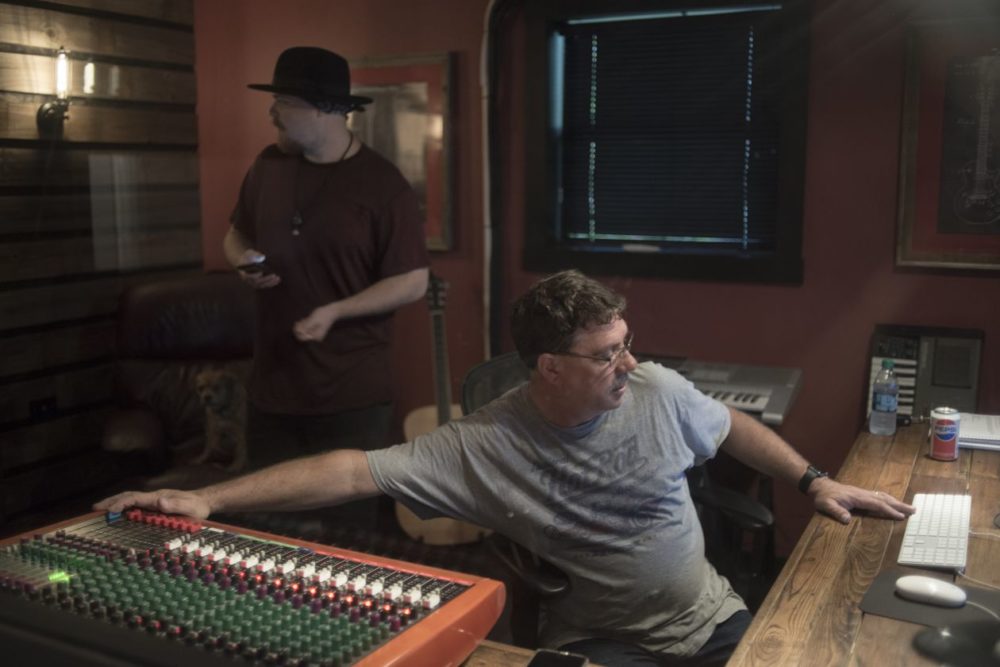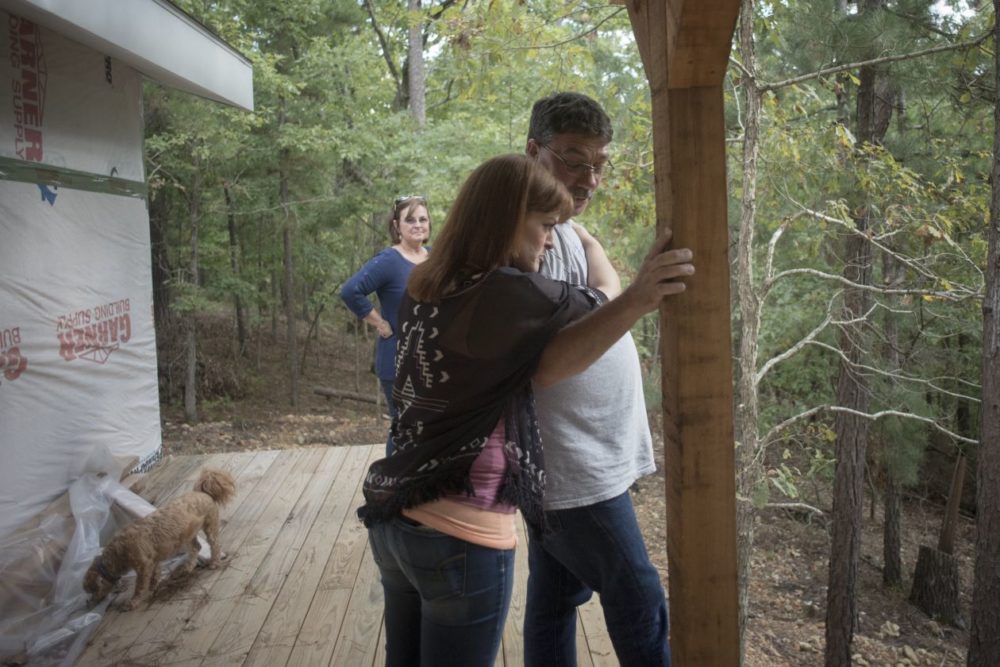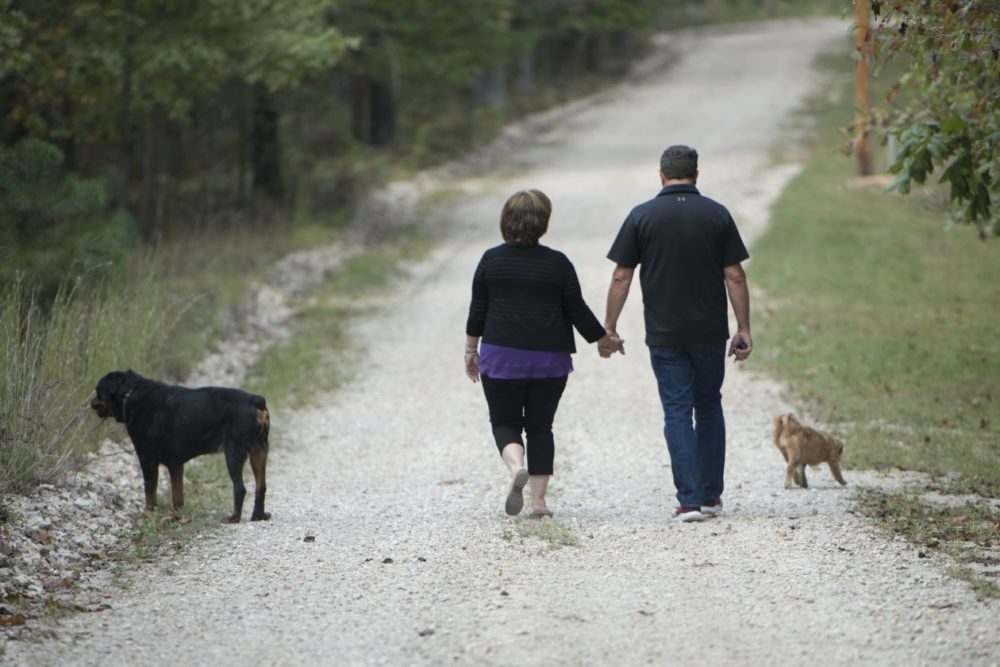‘I Was Hoping to Be Retired’: The Cost of Supporting Parents and Adult Children (#GotBitcoin?)
More Americans are being squeezed by the burden of caring for two generations—just when they thought they could kick back. ‘I Was Hoping to Be Retired’: The Cost of Supporting Parents and Adult Children
When Barb Strickert married, she and her husband wrote down a one-year plan for their lives together. And a three-year plan. Five- and 10-year plans, too.
Their meticulous mapping of the future eventually culminated in The Retirement Plan.
Barb would leave the corporate world in her early 60s and run a small bed-and-breakfast on their 11-acre wooded plot in the Ozark Mountains.
She and her husband, Brian, would convert the garage into a recording studio to promote local musicians.
The best-laid plans of Barb and Brian have gone awry. One bedroom of the would-be B&B, in their walkout basement, is now occupied by Barb’s 83-year-old mother, and the other by her 34-year-old daughter. Barb has reached 64, and, thanks to her new responsibilities, can no longer afford to quit.
“I was hoping to be retired by the age I’m at now,” she says. “That’s not going to happen. I’m going to work until I can’t do the job.”
 Daughter Rebecca, Left, Moved Back Home After Health Setbacks. Above, The Family Prays Over Lunch.
Daughter Rebecca, Left, Moved Back Home After Health Setbacks. Above, The Family Prays Over Lunch.There is a growing number of baby boomers who find themselves caring for both their elderly parents and their adult children, rather than kicking back at retirement age. They face the strain of constant caregiving and derailed dreams, as well as added expenses. It’s one more reason why many Americans are entering their retirement years as unprepared financially as any generation in years.
A 2014 study by the Pew Research Center found 52% of U.S. residents in their 60s—17.4 million people—are financially supporting either a parent or an adult child, up from 45% in 2005.
Among them, about 1.2 million support both a parent and a child, more than double the number a decade earlier, according to an analysis of the Pew findings and census data.
The squeeze is coming from both ends. With lifespans growing longer, the number of 60-somethings with living parents has more than doubled since 1998, to about 10 million, according to an Urban Institute analysis of University of Michigan data, and they are increasingly expensive to care for. At the same time, many boomers are helping their children deal with career or health problems, or are sharing the heavy burden of student loans.
Sixty-Somethings Are Pinched Between The Needs Of Elderly Parents And Adult Children, Including Looming Health-Care Costs And Lingering Student Loans.

Barb Strickert’s retirement plan fell victim to several bad turns. Her mother, rendered a shut-in by arthritis, didn’t have enough money for assisted-living facilities. Her daughter had to move back home after her own health setbacks.
“I can make all of the plans in the world right now and it doesn’t mean anything,” says Barb.
Barb and Brian
Living in Benton County, the birthplace of Walmart Inc., Barb made a career out of helping manufacturers and suppliers service the retail giant. Now she’s director of category management and business analytics for Cincinnati-based totes Isotoner Corp., which sells gloves, umbrellas and other products.
In 1995, Barb was divorced with two children when a friend invited her to a birthday party at Alibis, a country-and-western dance bar in Rogers, Ark., where Brian was a bouncer. An annoying chicken farmer kept asking her to dance. Brian elbowed him aside, took her hand and led her onto the dance floor.
Six months later, the two eloped. Barb had confessed only days earlier that she was 41, 13 years Brian’s senior. He didn’t mind.
The minister at the small timbered chapel pulled the vestment over the lures hanging from his fishing vest, rolled out a burgundy carpet, set up some fake flowers and declared them married.
The next couple in line threw rice on the Strickerts as they headed off to a two-day honeymoon in Branson, Mo.
 Barb At Her Corporate Office Outside Of Bentonville, Ark.
Barb At Her Corporate Office Outside Of Bentonville, Ark.Barb sang for years at church, while Brian ran the sound equipment during services. Now they attend Saturday night services at Fellowship Bible Church in Rogers, as well as small Bible study sessions every other Tuesday.
The Strickerts are planners. Barb had long envisioned living in a log house in the woods. In the 1980s, she set aside a house design she spotted in Country Living magazine, and after marrying she posted the picture on the fridge.
Brian, a heating and air-conditioning technician, re-created the house by hand on the lot by Beaver Lake. After an errant candle burned the house down in 2003, he built it again.
They began planning retirement when Barb was 55. The plan evolved over the years, but the gist was that they’d turn their 3,800-square-foot home into a B&B, plant an organic garden, call it Whispering Pines Farm and Home, and attract the craft-fair and motorcycle-rally crowds.
Brian sold his HVAC business in 2014 and spent 14 weeks in Nashville taking a sound-engineering course. He returned home, bought used high-end microphones and converted the garage into a hobby studio. Early clients include a local resort owner who’s recording a Christmas album and a nephew with a death-metal band.
 Brian With A Local Musician, Ryan Key, In The Family’s Home Music Studio.
Brian With A Local Musician, Ryan Key, In The Family’s Home Music Studio.Marlene
A running Strickert family joke was that Brian and Barb had built a home far too big for a couple of empty-nesters. Barb’s children, Rebecca and Michael, and Brian’s daughter, Krystle, had all moved out.
Brian hadn’t yet finished the studio, however, when Barb’s mother, Marlene Creitz, moved in with them.
Marlene grew up the child of sharecroppers in Dover, Kan., and married Jim Creitz when she was still in high school. Jim had a cherry-red hot rod he had built from a ’32 Ford at age 19. Marlene used to push-start his first dragster.
They raised Barb, her brother and two sisters in Tulsa, where Marlene worked as an administrator in a doctor’s office.
Many parents of boomers reached retirement age in the mid-1990s, as companies were cutting back on pensions and leaving their retirees to fend for themselves with Social Security and 401(k) plans. Marlene and Jim never built up a financial cushion. They had a bit of savings and Social Security. Marlene used to pray: “God, please don’t let me get sick before 65, because we don’t have any money to pay the bill.”
In their retirement, the Creitzes lived in a Holiday Rambler RV, but couldn’t afford gas for road trips. Hoping to make them more comfortable, Barb bought her parents a single-wide mobile home they installed in a Tulsa trailer park. One night in 2012, Jim set the automatic coffee maker for his morning cup, went to bed and never woke up.
 Barb’s Mother, Marlene, Now Can’t Move Around Without A Walker. ‘I Don’t Go Anywhere,’ She Says. ‘I Get Lonesome. I Really Do.’
Barb’s Mother, Marlene, Now Can’t Move Around Without A Walker. ‘I Don’t Go Anywhere,’ She Says. ‘I Get Lonesome. I Really Do.’At first, Marlene tried living alone in Tulsa, but Barb and her sisters worried about her safety in a declining neighborhood. The Strickerts moved the trailer to a mobile-home park not far from their house.
Often Marlene just stayed in bed, depressed about Jim and their son Donnie, who had died in his 50s. Getting around was difficult. Marlene has suffered from arthritis since the 1960s and had both hips replaced, one of them twice.
One day she crashed her car into the front deck of her mobile home. A neighbor spotted her trying to crawl up to the back door. Barb and her sisters decided Marlene could no longer live alone.
A yearlong stay with Barb’s sister in Missouri didn’t work out. In April 2015, Marlene moved into Barb’s basement, a suite that now has a small kitchen, two bedrooms and a sitting room.
Marlene’s knees hurt so much that she now can’t move around without a walker. Arthritis in her wrists and shoulders makes it hard for her to play gospel and ragtime on the keyboard in her sitting room. (“She’s kind of a Liberace honky-tonk,” says Brian.)
“I don’t go anywhere,” she says. “I get lonesome. I really do.”
She spends her days in fuzzy moccasins and a cushioned chair, watching Nascar races and the Weather Channel. Throughout the day, Marlene and Barb swap texts with updates on who’s leading the qualifying rounds and who’s getting heavy rain.
Marlene wanted to believe Barb’s house was a waypoint on her return to Tulsa. An assisted-living facility there would have cost $3,500 a month. Between her savings and her $1,106 monthly Social Security take-home, her money would have run out in 3 1/2 years, according to Marlene and Brian. That was 3 1/2 years ago.
Marlene’s arrival was fraught for Barb. No meal was right, no conversation to Marlene’s satisfaction. Finally, Brian snapped Marlene out of her torpor. “These are the facts of life,” he chided her. “You have to straighten up or we’re going to put you in one of those homes you don’t want to be in.”
Marlene couldn’t escape the sense that she was a burden. For years, she insisted on doing Barb and Brian’s laundry. Lately she has been too fragile to take on chores. “You’re doing too much for me,” she would tell Barb.
Barb would counter with a verse memorized from the Book of Timothy: “Anyone who does not provide for their relatives, and especially for their own household, has denied the faith and is worse than an unbeliever.”
“I know that if I want her to stop arguing, I should pull out the Good Book,” says Barb.
Marlene stopped arguing.
Rebecca
Four months after Marlene moved in, in August 2015, Barb’s daughter, Rebecca Wilkins, moved into the other basement bedroom.
Rebecca had moved out years earlier, managing an apartment building for work while kayaking and rappelling for fun, with a snorting laugh that itself made her snort with laughter.
Then, at age 25, old medical conditions flared up. She had been born with spina bifida and other spinal problems. She started having seizures. Back surgery left her with so much scar tissue that she is now inoperable. She blew two discs in her back.
“Everything kind of collapsed,” Rebecca says. “I went from being a normal person…to completely not functional in life at all.”
 Rebecca Hugs Brian As She Thanks Him For Building Her A Cottage On The Family Property.
Rebecca Hugs Brian As She Thanks Him For Building Her A Cottage On The Family Property.She puts her hand to her hip when she gets out of a chair, levering herself to her feet like someone more than twice her age. She can’t kayak any more—it would leave her sobbing in bed with pain.
The physical issues coincide with psychological challenges. She has been diagnosed with bipolar and anxiety disorders. A couple of rough relationships left Rebecca with symptoms of post-traumatic stress, and she remains persecuted by night terrors, she says.
Sometimes putting laundry in the machine constitutes a full day’s achievements.
Her only income is $700 in monthly disability payments, while Medicaid covers her drug bills and Medicare her doctor’s bills. The Strickerts pay for clothes, housing, food, car insurance and everything else that is beyond Rebecca’s meager income.
Brian is building her a cottage across the circle drive from the main house. Rebecca hopes it will restore a bit of her independence; she worries she won’t be able to clean it herself.
She rarely forgets to tell her parents that she loves them. “If I didn’t have these two amazing people in my life,” Rebecca says, “I’d be homeless.”
Full House
Tending to a sick child would have been one thing. But after adding in an aging parent, the Strickerts had to rework their plan. Barb earned more money than Brian could as an HVAC technician, so she put off retirement indefinitely.
Brian would stay home as the day-shift caregiver.
At 7 each morning, the Strickerts hammer out the day’s schedule on a color-coded shared scheduling app. Medical appointments, pharmacy runs, grocery shopping. Rebecca is orange, Brian is purple, Barb is blue.
Barb gets a month of paid vacation. She and Brian used to spend it hiking in Colorado or Wyoming, or taking in the sun in Florida. Now they spend vacations at home. One of Barb’s sisters takes in Marlene for a month each year, but that doesn’t cover Rebecca.
They’re hoping that one sister will move in for a week or two next year so they can take a road trip to Yosemite and the Pacific Northwest for Barb’s 65th.
“Of all my friends in this age group, I’m the only one who’s still working,” she says. “I have an idea of what I’d like to do, but I don’t feel at liberty to do it right now.”
Barb has a $1,000-a-month pension from an old job, and the couple has retirement accounts. The money would be enough to retire on if there were just the two of them, they say. But they’re also saving for Rebecca’s long-term care and covering some of Marlene’s daily expenses.
“The only thing that worries me is that my health holds out long enough to generate the income I have to generate,” Barb says. She’s looking into other ways to make money—renting out rooms perhaps, or consulting.
 The family Inside Rebecca’s Cottage.
The family Inside Rebecca’s Cottage.More than a third of people in their 60s who are caring for parents reported a “moderate-to-high level of financial strain” as a result, a survey by the National Alliance for Caregiving and AARP found.
Some 18 months ago Barb started to experience growing anxiety. Brian watched her essential tremors worsen, a gentle bobbing of her head.
Six months later, Barb found herself sleeping 14 hours a night, sapped of energy and joy. In January, she started to feel tightness in her chest. The cardiologist diagnosed her with stable angina, brought on by a blocked artery and compounded by stress. Angina and cholesterol drugs helped ease her symptoms.
When things get especially tough, she calls in friends from church, a group she calls her “prayer warriors.” At one low point, Barb sought advice from a social worker from a nearby senior center. The social worker warned that she wouldn’t be of much use to her family if she wore herself out.
Barb followed her advice and hired someone to clean and shop. Marlene pays her share. During a mother-daughter visit to the hair salon last month, Barb asked Rebecca to take on light administrative duties—open Barb’s bills, make a few appointments. Rebecca was thrilled at the prospect of regaining a sense of purpose.
In her optimistic moments, Rebecca believes she’ll be independent again someday, perhaps even pain-free. In her darker ones, she fears things will never be the way they were.
“I feel for my parents,” she says. “I know this is not the relationship they wanted with their adult child.”
Marlene hopes for her own quick death, so she’ll no longer be a worry to her family.
“I’m of the age now where I’m looking forward to changing address, stepping over to the heavenly side,” she says, as images of wildfires and floods flicker across the Weather Channel screen.
Barb has let go of any bitterness she may have felt when her own dreams were shelved.
“You have to finally get to the attitude that whatever will be will be,” she says. “You don’t abandon family because something’s inconvenient.”
She and Brian no longer write down their plans.
 Barb And Brian On Their Daily Walk.
Barb And Brian On Their Daily Walk.Related Articles:
A Retirement Wealth Gap Adds A New Indignity To Old Age (#GotBitcoin?)
The New Retirement Plan: Save Almost Everything, Spend Virtually Nothing (#GotBitcoin?)
401(k) or ATM? Automated Retirement Savings Prove Easy to Pluck Prematurely
Your questions and comments are greatly appreciated.
Monty H. & Carolyn A.
Go back
Leave a Reply
You must be logged in to post a comment.